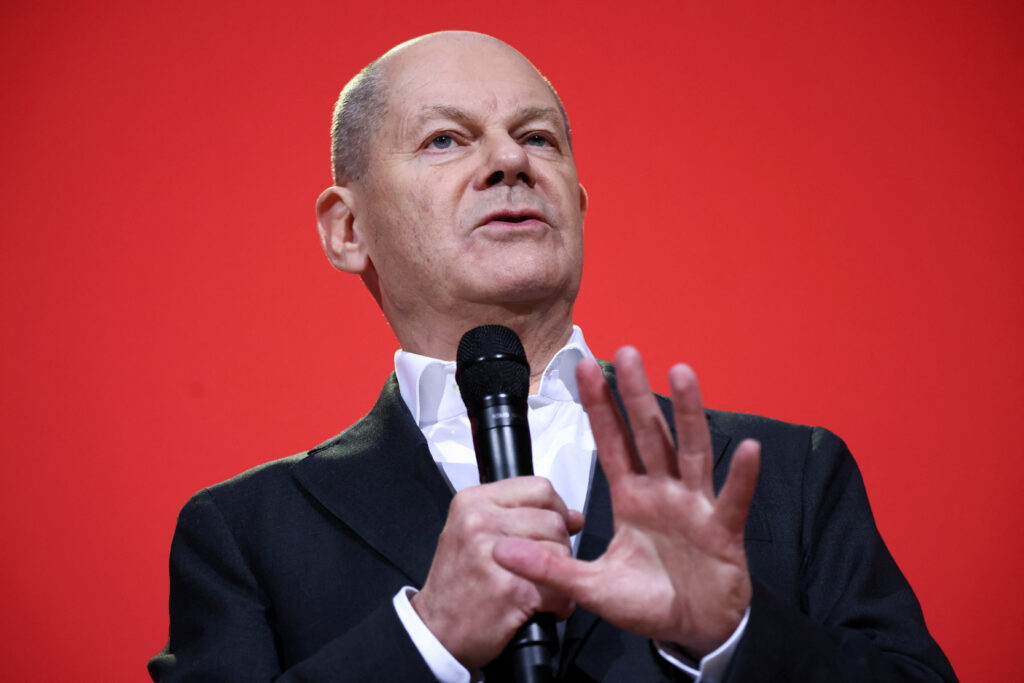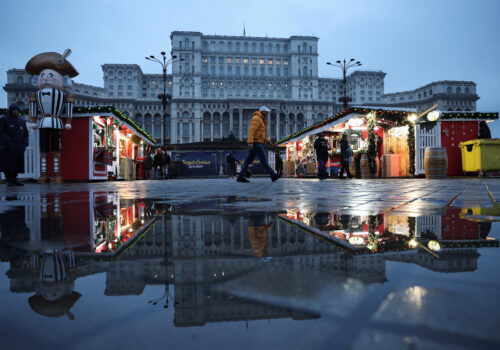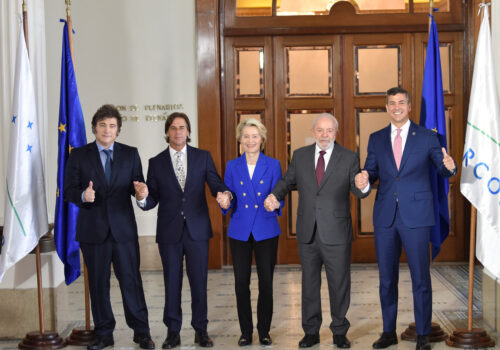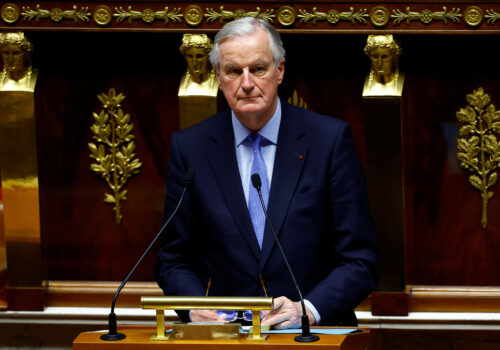On Monday, German Chancellor Olaf Scholz lost the no-confidence vote he had called in the Bundestag, paving the way for early elections in Europe’s largest economy in 2025. That may end up being a good thing for Germany and its role in Europe and the transatlantic partnership.
The move followed weeks of political haggling in the aftermath of Scholz’s three-way coalition collapsing on November 6, itself the result of more than a year of dysfunction, political warfare, and personal animosity among the coalition partners.
One might assume that Germany is the latest in a series of democracies to fall into self-induced political turmoil this year, following France, South Korea, Romania, and others. But that assessment fails to look deeper at the politics in Berlin. Just as new reevaluations of the supposed stability of the Angela Merkel years reveal major underlying problems, the apparent instability of Scholz’s term lays the path for a relatively steady way forward. In that sense, a no-confidence vote and early elections are a relief compared to the alternative, which would have been a divided three-way coalition hobbling along unable to get anything done until the originally scheduled elections took place in September 2025.
The feeling is most palpable in Berlin. Ever since the news of the government’s demise, there has been a sense of relief that the experiment of the traffic light coalition is over. Internal coalition disputes on major issues such as the budget, industrial and clean energy transitions, China, and even Ukraine made decision-making in Berlin look like a patchwork of three separate governments on any given day. Sniping across rival ministries played out in the press, absent leadership in the Chancellery led to dysfunction and paralysis when geopolitical crises developed, and economic woes remained stubbornly persistent.
This paralysis had real policy implications. On the issues that mattered most, Germany acted as a brake that ground progress to a halt rather than a gas pedal that accelerated it. The Zeitenwende, or “turning point” on foreign and defense policy, once a bright spot for the government, has fallen flat as the Bundeswehr’s struggles remain well-documented, and German defense spending cannot keep up with new demands. Further, nearly three years after Russia’s full-scale invasion of Ukraine in February 2022, Berlin is still one of the principal opponents (along with the United States) of advancing NATO membership discussions or providing more lethal weapons for Ukraine. For all the excitement around “releasing the Leopards” in 2023, there’s still no appetite for sending the Taurus missile system, and Scholz has made it clear that position wouldn’t change.
None of these ongoing dynamics would have gone over well with the incoming Trump administration. In fact, the current government and its problems likely would have been disastrous for the US-German relationship. Whereas the Biden administration worked overtime to keep the Germans close, Berlin will not to be so lucky in the next four years.
President-elect Donald Trump and his allies are no friends of Germany to begin with. Over the past couple years, Trump allies such as Senator Mike Lee and Vice President-elect JD Vance have outwardly chastised Germany for its free riding off of US security guarantees. At this point, Germany cannot afford any missteps that would provide an opportunity for the next administration to use it as the standard bearer for Europe’s supposed fecklessness.
Instead, an election offers a fresh start, or at best a fresh start as one can hope for. Here are a few things to watch for:
First, the upcoming elections, likely to be held on February 23, are taking place on a condensed timeline. Accounting for a month or two of coalition negotiations, there could realistically be a new government in Berlin by April, coinciding with the Trump administration’s staffing of its own agencies and departments. Avoiding a drawn-out process will be the key to clarity.
Second, if polls hold—and they are usually reliable in Germany—the likely outcomes will mean relative stability under a conservative government. Expect another grand coalition like in the Merkel era, led by the Christian Democratic Union. A Christian Democrats and Greens coalition would be more of a long-shot. But such a coalition would produce a more hawkish outcome on virtually all major foreign policy issues, from Ukraine/Russia to China and German rearmament—and would create more of an opening for engaging the Trump administration. This dynamic would likely be better received in Washington, both because a center-right-led government would more closely align with the Trump administration politically and because the chancellor would have a stronger mandate for action than Scholz did in the three-way coalition.
The political woes of the last government, however, do not guarantee success for the next one. Any new government will have its work cut out for it to make the case for the US-German and the NATO partnership to an administration that will likely be less inclined to buy into the rhetoric of the transatlantic alliance. Germany will also have to confront hard questions over budgetary challenges and prioritization, US-German trade, its defense policies, its approach to China, and more. That will be a political test for whoever ends up in the Chancellery.
Germany should not have to change just to please the incoming US administration. It should do it for its own sake, too. It will take much more decisiveness and political will across the board to prove that Germany can be a strong ally in Europe and for the United States, and that it can lead on the challenges facing the transatlantic partnership. That should be the starting point for any new German government.
Jörn Fleck is the senior director of the Atlantic Council’s Europe Center.
Rachel Rizzo is a nonresident senior fellow with the Atlantic Council’s Europe Center.
Further reading
Mon, Dec 16, 2024
Dispatch from Bucharest: Why has Romanian politics suddenly gone sideways?
New Atlanticist By Daniel Fried
Twin shocks—Călin Georgescu’s political rise and the annulment of the November 24 presidential election—have shaken the hitherto complacent centrists in Romania.
Fri, Dec 6, 2024
Four questions (and expert answers) about the EU-Mercosur trade deal
New Atlanticist By
Our experts share their perspectives on the landmark trade deal between the European Union and the South American economic bloc.
Thu, Dec 5, 2024
Experts react: France’s government lost a no-confidence vote. What’s next?
New Atlanticist By
Our experts share their insights on the collapse of the French government after Prime Minister Michel Barnier lost a no-confidence vote.
Image: German Chancellor Olaf Scholz speaks during a press conference ahead of the German general election to present the Social Democratic Party (SPD) programme, in Berlin, Germany, December 17, 2024. REUTERS/Liesa Johannssen



